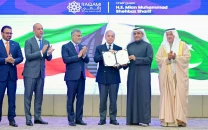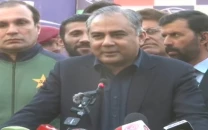Senate panel clears ‘watered-down’ bill
Excludes income tax fraud from ambit of proposed law

Excludes income tax fraud from ambit of proposed law
A Senate panel on Wednesday finally approved a watered-down anti money laundering (AML) bill with a majority vote, excluding income tax fraud from the ambit of the legislation and limiting the law’s application to sales tax and federal excise duty fraud only.
The decision of the Senate Standing Committee on Finance to exclude the income tax offences from the list of fiscal crimes is contrary to the concept of bringing money related offences under the AML law. Income tax evasion remains the biggest issue in the country where only 912,000 people file income tax returns.
AML Bill — time to be bipartisan
The exclusion will also create problems for the government in a global inter-governmental body – Financial Action Task Force (FATF) – and the International Monetary Fund.
Parliament is not subservient to the IMF and the government’s proposed bill was not in the interest of the businesses, said the committee members belonging to the opposition parties. PML-N senators Nuzhat Sadiq and Ayesha Raza Farooq opposed the panel’s recommendations, which are binding in nature.
Under its international obligations, the government was supposed to bring income tax, sales tax and federal excise duty fraud cases under the scope of the AML bill aimed at discouraging terror financing and money laundering.
Key bill fails to clear hurdle in senate panel

The government had originally proposed to bring 26 fiscal offences under the ambit of the legislation but the standing committee allowed only three – two related to sales tax and one related to federal excise duty. The tax offences committed under sections 11 and 13 of the Sales Tax Act and section 19-3 of Federal Excise Act will now be prosecuted under the AML act.
Chairman of the standing committee, PPP Senator Saleem Mandviwalla termed the approval of the amended but a diluted bill ‘a good beginning’. The government is equally responsible for the approval of the diluted AML bill as it sent a second-tier team to defend one of the most critical pieces of legislation in a hostile standing committee.
The standing committee has never hidden its intentions and made it clear that it would never approve the government’s bill in its original form.
Anti-money Laundering: Govt agrees to whittle down fiscal crimes list
However, some of the concerns of the standing committee members were genuine, as they feared harassment by corrupt taxmen. The government could not offer concrete assurances to parliamentarians to address their
genuine concerns.
Senator Ilyas Bilour of ANP, who is also member of the committee, brought his case of alleged arm-twisting by taxmen who sought Rs7.3 million bribe from him to settle his case. Senator Bilour said he sent a written complaint against the corrupt officials to FBR Chairman Tariq Bajwa but the latter took no action against the officials.
The bill will now be tabled in the Senate for voting. Although the National Assembly has already passed the AML Amendment Bill, it will again go back to the lower chamber of Parliament for revote. In case the NA decides to reject the Senate’s amendments, the bill will be presented in a joint session of Parliament.
Govt to review limit for punishing tax evaders
“The message that is going out today that income tax fraud will not be an AML offence but sales tax fraud will be, will not be taken in good spirit,” said Muneeb Zia, legal consultant to the Ministry of Finance. Mohsin Kamal, a legal expert who helped the Senate panel in forming its opinion, said that the proposed sections of Income Tax Ordinance that the government wanted to bring under the AML law did not fit the definition of income tax fraud.
The government wanted inclusion of section 192 of Income Tax Ordinance that deals with the prosecution for submission of false tax statements and section 194 – prosecution for improper use of National Tax Number – in the ambit of AML Act.
Published in The Express Tribune, October 29th, 2015.



















COMMENTS
Comments are moderated and generally will be posted if they are on-topic and not abusive.
For more information, please see our Comments FAQ